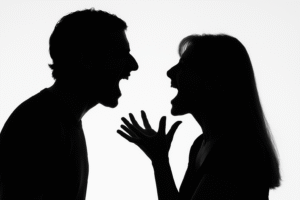You Thought It Was Love… Until It Started to Hurt
They said they loved you, but your chest feels heavy, your confidence is gone, and you keep saying “I’m fine” while dying inside. You overthink every word. You apologise for things that aren’t your fault. You feel exhausted, confused, and alone… even with them. Please note that:
“Toxic relationships don’t always come with bruises. Sometimes, they come
with apologies, affection, and “I only want what’s best for you.”
If you feel quite so familiar… this isn’t merely a rocky period. It could be something much more debilitating — something gnawing at your self-esteem while masquerading as love. And it’s time we discussed it.
Because what you’re experiencing isn’t weakness — it’s your intuition attempting to
rescue you.
What Is a Toxic Relationship, Really?
A toxic relationship is any connection—romantic, family, or otherwise-that makes you feel drained, depleted of self-worth, and emotionally safety. This isn’t about the rare fight. It’s about a cycle of control, guilt, fear, manipulation, or emotional abuse. And the worst part? Love, loyalty, or tradition is often the mask.
“They don’t have to hit you to hurt you. Sometimes, they just keep you small… so they can feel big.”
You might still receive gifts, or affection, or attention, but there’s an emotional tariff: silence, control, passive-aggressive punishment. In a good relationship, you evolve. In a toxic one, you shrink.
The Many Faces of Toxic Love
Toxicity comes in many guises, and some of the most severe ones may come from those who look shiny and nice on the outside. It may be an illusion — things are not what they seem to be, nor are people. Toxic relationships are not limited to romantic partners. Their presence can be anywhere — your family, your friendships, and where you work. Let’s break it down:
1. Toxic Romantic Relationships: When Passion Turns Poison:
It comes from passion but turns into control, confusion, and emotional fatigue. You confuse intensity with love — until you find yourself lost, constantly apologizing, and shrinking into someone you barely recognize. This isn’t love. It’s emotional erosion in camo.
 Signs included:
Signs included:
● Gaslighting: This term is emotional abuse in which someone manipulates you into questioning your reality. It’s not just lying — it’s lying that makes you feel crazy or wrong when you know you’re right.
● Love bombing: Love bombing is when someone floods you with sweet nothings early on in a relationship. It’s a magical, fairytale romance, magnificent friendship — it’s not real love. It’s emotional bait.
● Silent treatment: You’re being punished. Silent treatment is a form of punishment that involves withholding communication and affection. It’s not about needing space—it’s about power and control.
● Jealousy as Love: It’s when someone hides what are aspects of controlling behavior behind a veneer of care or concern. They are overly possessive, but they call it “just loving you so much.” You begin treading on eggshells, always trying not to offend them. Why can’t they love me how I need? You mumble, pushing into a version of yourself that is not your own
2. Toxic Family: When Blood Becomes the Bond That Chokes You:
The notion that “family is everything” can become suffocating in relationships with toxic relatives. Controlling parents, shaming by relatives, and guilt-tripping disguised as “concern” build up to create a toxic atmosphere, one that can be emotionally exhausting. Such behaviors can have very long-term consequences, especially when the manipulation is disguised as love. Toxic family behaviors are common, such as:
● Narcissistic Parents: Narcissistic parents are very critical, controlling, and emotionally manipulative, and place their needs above their children’s health.
● Guilt Tripping: Whether that is because you’re always feeling guilty from guilt-tripping, as “I did so much for you, etc.”
● Emotional Blackmail: It is a manipulation ploy where the parents use guilt, fear, or a sense of obligation to make the children do what they want.
They shit on your accomplishments, dictate your choices, and act like pain is protection. And as they are “family,” you are instructed to forgive and forget.
“They didn’t hit me, but they broke me in invisible ways.”
3. Toxic Friendships: When Support Turns into Sabotage:
Unhealthy friendships suck the lifeblood and joy from you until it takes the form of duty, which is when you are doing all the heavy lifting and getting little in return, and you start to feel used, manipulated, and depleted.
“You laugh together, but deep down, you’re tired.”
This line speaks to the emotional drain that usually hides behind the smiles. It speaks to how these friendships can seem entertaining, but deplete you underneath. Signs of Toxic Friends:
● Ever the Victim – They always want to blow off steam, but never want to own up, or be there for you, or others. You are their emotional trash can.
● One-Way Support – You are meant to be there for them when life is hard, but they disappear when you require assistance or emotional support.
● Media created jealousy – They are not too happy to have you succeed. Instead of applauding your success, they show their jealousy through back-handed compliments, being passive…
“Real friends don’t let you die of thirst emotionally.”
A real friendship is reciprocal and nourishing, not depleting. This line really hit home that love and loyalty should never be at the expense of your own emotional well-being.
“Friendship should feel like freedom, not an undervalued emotional IOU.” This is a powerful closing line: Friendship is a safe space, not a commercial exchange in which you’re constantly the one paying the emotional toll.
Why You Stay Even When It Hurts
You’re not stupid.
You’re not weak.
You’re trauma-bonded.
That is, you’ve found yourself in a cycle so emotionally overwhelming, there seems no getting out of it, even though it may be painful as hell. One moment, they’re cold. Next, they’re warm again. You find those rare instances of tenderness as though you were gasping for air. And when they hurt you? You blame yourself, and you try harder, because love can fix it. This isn’t love. It’s emotional addiction. Toxic relationships are like amusement park roller coasters: dramatic ups and downs. The chaos becomes normal. And the silence is the punishment. And you learn to conflate anxiety with love, because at least it’s something.
You stay because:
● The fear of being alone feels scarier than remaining in pain.
● Low self-worth is telling you this is all you are worth.
● Hope they’ll change is what keeps you rooted in potential, not reality.
● We become emotionally or financially dependent, and leaving can seem impossible.
● Wounds from childhood have taught you that love never comes without pain, that you have to work for it.
“You stay not because you love the person they are —
But because you’re addicted to who they pretend to be in their best moments.”
But those “best moments” are the bait. And you deserve so much more than someone who loves you in pieces.
How to Walk Away From a Toxic Relationship (And Not Look Back)
The hard work of leaving a toxic relationship is much more than just emotional. Forensically, then, what do I need to pack in the bag, and how the hell do I get myself out of here? It’s deep emotional work — unlearning manipulation, rebuilding your self-esteem, and learning how to protect your peace. Every one of the steps you described is important. Let’s dive deeper:
● Face the truth: Admit it’s toxic — don’t deny, don’t hope it’s going to change.
● Extract emotionally: Begin detaching mentally and emotionally.
● Plan your escape: Set up living, money, and safety arrangements.
● Cuts all contacts: Block them everywhere: Silence is healing.
● Strengthen support: Rely on friends, therapy, and support groups.
● Reclaim yourself: Engage in activities that remind you of who you are.
● Draw a boundary: Don’t go back, even if they beg.
● Repeat this to yourself: You aren’t betraying anyone by leaving — you are rescuing yourself.
Leaving Isn’t Betrayal. It’s Self-Rescue.
Explanation:
You can feel guilty trip to leaving them, and the other person can play the emotional blackmail game or portray themselves as a victim. But to choose yourself is not betrayal; it’s merely survival. It’s reclaiming your worth.
Why this matters:
Referring to the decision to leave as self-rescue and not as a betrayal can help you change the focus of your mindset from guilt to empowerment.
Healing After Toxic Love: What Real Love Feels Like
After you’ve been in a relationship that’s poisoned, wholesome love can feel, well, deadly dull. But that’s not because it doesn’t have passion — it’s because your body and mind got used to emotional chaos. Your nervous system was always on high alert, responding to drama, manipulation, and inconsistency. So when real love arrives — calm, consistent, reasonable love — it feels foreign. That’s not boredom. That’s peace.
What Real Love Actually Feels Like:
● Peaceful, not performative – You do not have to put on a show or make yourself small to be worthy of love.
● Secure, not suspicious – You have faith in them, and you feel confident that they have faith in you.
● Supportive, not smothering – You can develop as a person, not confined or alone.
● You don’t have to deserve it – Love comes true based on your choice; you don’t have to keep jumping through hoops.
● You stop wondering if you’re “too much” – Because the fact is, the issue was never with you, it was the fact that they didn’t care.
Recovery isn’t just about getting away from the toxic person. It’s about choosing yourself every single day, gently creating a new emotional foundation, and learning how to accept the love that you know you deserve, because you do. What Healing Looks Like:
● Therapy – A controlled environment to work through the trauma and re-adjust your emotional habits.
● Rebuilding boundaries –You learn to say ‘no’, to guard your space, to deny entry of toxicity.
● You stop leaving yourself for others and you start loving yourself. You value your peace and joy.
● Forgiving yourself for leaving – You left because you had to. Now you know better, and that is strength, not failure.
Final Words: You Deserve Love That Doesn’t Hurt
You are not broken. You just loved someone who didn’t love you right. Healing means choosing yourself without guilt. Real love feels safe, not like survival. Unlearn the pain. Rebuild your peace. Because you deserve love that doesn’t hurt. Always.

